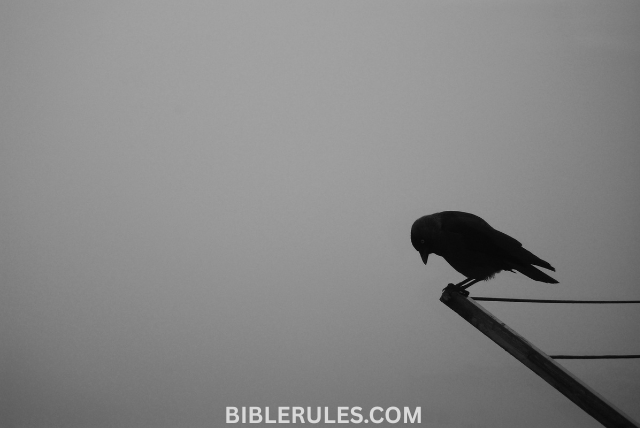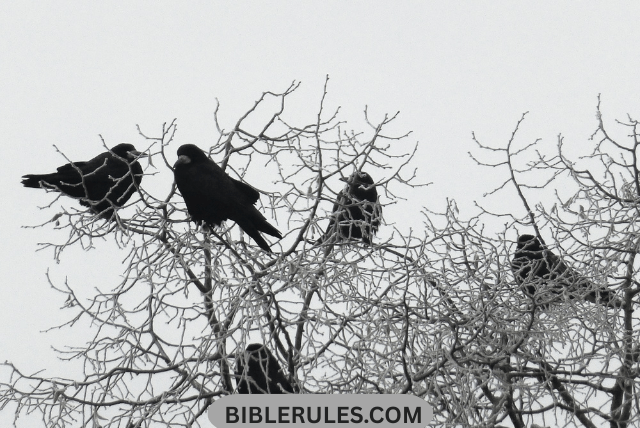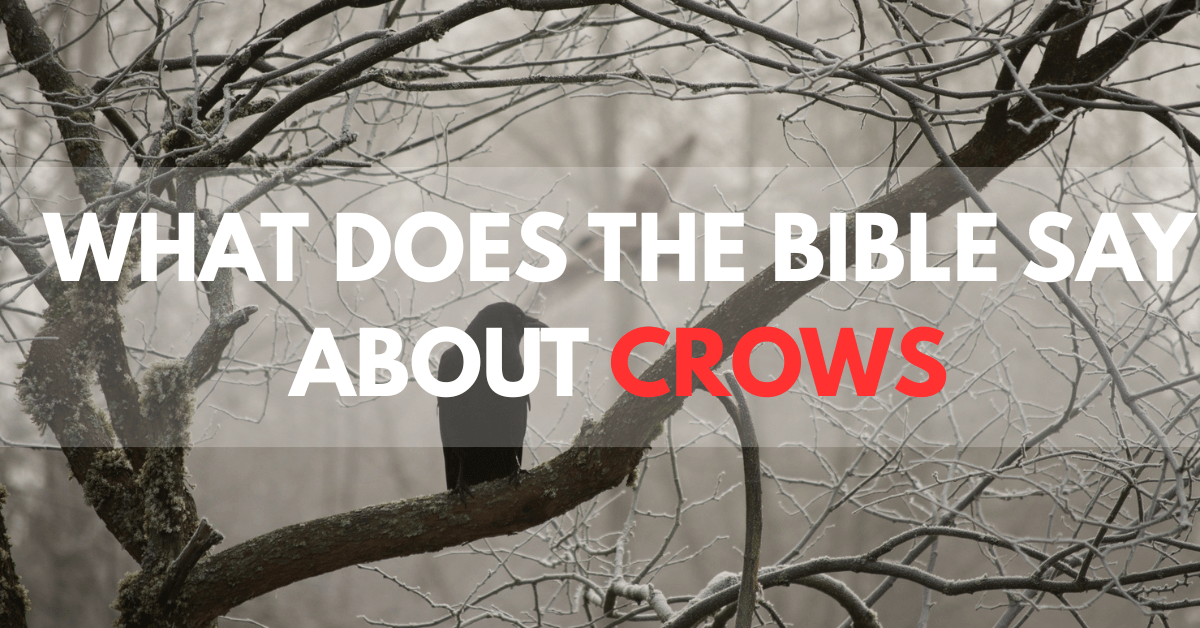I still remember the first time I saw a raven sitting silently on a fence near an old church. Its black feathers, spread with a wide wingspan, caught the sunlight just right — it looked both eerie and majestic. In the Bible, crows and ravens are not just birds of the world; they carry deep symbolism and hold spiritual weight. Mentioned in Scripture, these creatures often appear in deserts, mountains, forests, and even near foothills, almost always in solitary settings. Their plumage, sharp beak, and presence in dark moments link them closely with death, mystery, and divine messages. Some even believe they are signs from above — either of good or evil. Whether feeding on meat or drawn to blood, they’ve long been symbols of warning or guidance, sometimes representing divine provision and other times judgment.
There’s a fascinating legend from the Tower of London, where a raven master ensures that at least six ravens remain on site. It’s said that if they ever leave, the kingdom will fall. These birds are fed precisely 170g of raw meat daily — proof of how seriously such traditions are taken. This echoes back to biblical times when even a raven was chosen to carry God’s will. In Scripture, their role isn’t random; they are related to stories of survival, fate, and the unknown. Whether scavenging across ancient canyons or circling high cliffs, their appearance often carried weight — like when Noah released a raven after the flood. In total, the average raven measures 24 inches — just enough to make its shadow linger longer than most, like a reminder of the spiritual realm that never quite leaves us.
What Does the Bible Say About Crows?
God’s Care for Birds and What It Teaches Us
I remember one quiet afternoon reading Luke 12:24, where Jesus says:
“Consider the ravens: for they neither sow nor reap; which neither have storehouse nor barn; and God feedeth them: how much more are be better than the fowls?”
That verse changed the way I looked at birds — not just as part of creation, but as living symbolic signs. Whether it’s ravens, fowls, or crows, their presence in Scripture teaches lessons about God’s providential care. These theological insights are not random; they’re deeply woven into the narrative of the Bible. The bird becomes a metaphor — a silent voice reminding us to trust the divine, even when we cannot see the path. These aren’t just creatures that fly in the heaven, but symbols of divine order, feeding not from storehouse or barn, yet never forgotten.
Warnings, Judgment, and the Call to Repentance
Then there’s the story of Peter‘s denial, echoing through Matthew 26:74 —
“Then began he to curse and to swear, saying, I know not the man. And immediately the cock crew.”
And again in John 18:27 —
“Peter then denied again: and immediately the cock crew.”
The cock’s crowing wasn’t just sound; it was a spiritual judgment, a wake-up call after betrayal, a moment of repentance, of human weakness meeting grace. Later, in Revelation 19:17, we find powerful apocalyptic imagery:
“And I saw an angel standing in the sun; and he cried with a loud voice, saying to all the fowls that fly in the midst of heaven, Come and gather yourselves together unto the supper of the great God;”
It’s here that fowls, possibly scavengers like crows, are summoned by divine command to partake in a scene of retribution and death. As someone who’s reflected deeply on these verses, I believe even the smallest bird carries a symbolism that calls for vigilance, for watching our steps in a world rich with spiritual messages — be it in a curse, a swear, or the crow of a rooster under the sun.

Trusting God’s Provision Over Worldly Needs
I remember reading Luke and pausing at the mention of the raven. The bird is used to show how God, in His sovereignty, provides not only for the fowls of the air but for us, too. We’re reminded of this again in Matthew 6:26 (KJV):
“Behold the fowls of the air: for they sow not, neither do they reap, nor gather into barns; yet your heavenly Father feedeth them. Are ye not much better than they?”
This truth encourages trust in God’s grace rather than slipping into anxiety over our daily needs. These themes of divine provision, dependency, and careful reflection call believers to look beyond physical barns and instead rest in the assurance of His care. Just as the raven is not forgotten, neither are we—believers made in His image and deemed better than all creation.
When the Rooster Crows: A Call to Vigilance
In the story of Peter’s denial, the cock crowing became a reminder of spiritual failure, sorrow, and the urgent need for repentance. This sobering moment is described vividly in Mark 14:72 (KJV):
“And the second time the cock crew. And Peter called to mind the word that Jesus said unto him, Before the cock crow twice, thou shalt deny me thrice. And when he thought thereon, he wept.”
Peter’s sorrowful response reflects what many of us face: a moment where we fail in faith or integrity. Yet the sound of the cock becomes more than noise—it is a spiritual alarm to remain vigilant. When we deny Christ under pressure, we must confront our weakness and strive to rebuild spiritual strength. That crying rooster invites us all to be honest with ourselves, especially in moments that test our commitments.
Birds, Judgment, and the Darkness of the End Times
Biblical judgment scenes, especially in Revelation, often include birds as agents or symbols of divine reckoning. Crows, long connected with darkness, echo this ominous truth. Jude 1:13 (KJV) offers a vivid picture of such judgment:
“Raging waves of the sea, foaming out their own shame; wandering stars, to whom is reserved the blackness of darkness for ever.”
This verse combines natural chaos — waves, foaming, and wandering stars — with spiritual shame, showing the severe accountability for turning from God. Crows, like other scavenging birds, may be interpreted as part of this imagery, called together in the gathering of the end times. In that turmoil, they become messengers of justice, not just creatures of instinct. This vision presses us to consider our place in the grand theological narrative of crying, judgment, and divine consequence.
More Than Scavengers: The Biblical View of Crows and Ravens
People often think of crows and ravens as dark, mysterious birds, mostly due to their black color and scavenging behavior. In the Bible, although crows are not directly mentioned, ravens are — and they are part of the same bird family. They are seen as highly intelligent, yet in Leviticus 11:15, they were classified as unclean animals not to be eaten by the Israelites:
“Every raven after his kind.”
Because they fed on dead flesh, they were often associated with death, and sometimes misunderstood as symbols of something evil. But that’s not how God views them. He used even these birds in surprising ways to fulfill His purpose. It’s a strong reminder that every part of creation has meaning — and no creature, clean or unclean, is without potential in His plan.
God’s Care for the Overlooked
One of the most tender examples of God’s provision for these misunderstood birds comes from Job 38:41 (KJV):
“Who provides food for the raven when his young ones cry unto God, they wander for lack of meat?”
This verse paints a powerful image of young ravens in need — calling out, wandering, waiting for provision. Even birds often overlooked by people are not forgotten by God. This is echoed in Psalm 147:9 (KJV):
“He giveth to the beast his food, and to the young ravens which cry.”
God values every one of His creatures, whether a cattle, a lamb, or a raven. They aren’t symbols of doom, but reminders of how much God provided for even the smallest needs. These verses gently challenge us to trust that if God cares for the birds, He surely cares for us too.
Ravens in the Ark: Survival, Not Symbolism
In the story of Noah, a raven is the first bird sent from the ark to survey receding waters. Genesis 8:6‑7 (KJV) says:
“After forty days Noah opened a window he had made in the ark and sent forth a raven, which went forth to and fro, until the waters were dried up from off the earth.”
Unlike the dove, the raven never returned—perhaps drawn to floating debris or acting as a true survivor. This bird, though unclean, illustrates that God’s creatures have innate purpose and resilience built into creation.

Ravens Feed Elijah: Provision in Hard Times
In 1 Kings 17:4‑6 (KJV) we read:
“And it shall be, that thou shalt drink of the brook; and I have commanded the ravens to feed thee there. So he went and did according unto the word of the Lord: for he went and abode by the brook Cherith, that is before Jordan. And the ravens brought him bread and flesh in the morning, and bread and flesh in the evening; and he drank of the brook.”
Here, ravens—typically scavengers—are instead instruments of divine provision during famine, carrying bread, meat, and sustaining Elijah under God’s control and care.
Wisdom in Crows: Even Small Brains Think Big
The Bible honors wisdom, even in tiny creatures. Proverbs 30:24‑25 (KJV) states:
“There be four things which are little upon the earth, but they are exceeding wise: The ants are a people not strong, yet they provide their meat in the summer.”
Though crows aren’t named here, their notable intelligence and tool use echo this truth: God grants wisdom regardless of a being’s size or background—showing that we, like the smallest of birds, can reflect divine insight.
Birds as Messengers: Provision and Value
In Matthew 6:26 (KJV), Jesus explains:
“Behold the fowls of the air: for they sow not, neither do they reap, nor gather into barns; yet your heavenly Father feedeth them. Are ye not much better than they?”
Here, birds—including ravens and crows—serve as messengers of God’s generous nature. They don’t store food yet remain valuable and fully cared for, reminding us to trust God’s provision.
Debunking Omens: Bad Luck Is Not Biblical
Many see black crows as omens of death or bad superstition, but Scripture disagrees. Ecclesiastes 9:11 (KJV) tells us:
“I returned, and saw under the sun, that the race is not to the swift, nor the battle to the strong, neither yet bread to the wise, nor yet riches to men of understanding, nor yet favour to men of skill; but time and chance happeneth to them all.”
This reminds us our life’s course isn’t driven by signs or omens, but by God’s will and chance, not random superstition.
Seeing God in Every Creature: Creation Reflecting Creator
Finally, Romans 1:20 (KJV) declares:
“For the invisible things of him from the creation of the world are clearly seen, being understood by the things that are made, even his eternal power and Godhead; so that they are without excuse.”
Whether crows, ravens, or any bird cleaning waste, controlling insects, or spreading seeds, each design speaks of God’s eternal, divine power and nature—a living hand of provision and wisdom we can’t ignore.

